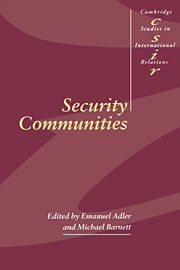Book contents
- Frontmatter
- Contents
- Notes on contributors
- Acknowledgements
- Part I Introduction and theoretical overview
- Part II Studies in security communities
- 3 Insecurity, security, and asecurity in the West European non-war community
- 4 Seeds of peaceful change: the OSCE's security community-building model
- 5 Caravans in opposite directions: society, state and the development of a community in the Gulf Cooperation Council
- 6 Collective identity and conflict management in Southeast Asia
- 7 An emerging security community in South America?
- 8 Australia and the search for a security community in the 1990s
- 9 The United States and Mexico: a pluralistic security community?
- 10 No fences make good neighbors: the development of the US-Canadian security community, 1871–1940
- 11 A neo-Kantian perspective: democracy, interdependence and international organizations in building security communities
- Part III Conclusions
- Index
- CAMBRIDGE STUDIES IN INTERNATIONAL RELATIONS
6 - Collective identity and conflict management in Southeast Asia
Published online by Cambridge University Press: 30 October 2009
- Frontmatter
- Contents
- Notes on contributors
- Acknowledgements
- Part I Introduction and theoretical overview
- Part II Studies in security communities
- 3 Insecurity, security, and asecurity in the West European non-war community
- 4 Seeds of peaceful change: the OSCE's security community-building model
- 5 Caravans in opposite directions: society, state and the development of a community in the Gulf Cooperation Council
- 6 Collective identity and conflict management in Southeast Asia
- 7 An emerging security community in South America?
- 8 Australia and the search for a security community in the 1990s
- 9 The United States and Mexico: a pluralistic security community?
- 10 No fences make good neighbors: the development of the US-Canadian security community, 1871–1940
- 11 A neo-Kantian perspective: democracy, interdependence and international organizations in building security communities
- Part III Conclusions
- Index
- CAMBRIDGE STUDIES IN INTERNATIONAL RELATIONS
Summary
Introduction: security communities and Non-Atlantic Areas
When Karl Deutsch and his associates first proposed the idea of security community they were seeking to explain the emergence of cooperation among the developed states of the north Atlantic region. Neither they, nor most of the other scholars who have used the concept since, have taken serious note of the possibility of security communities in the developing world. This is hardly surprising as the Third World is a rather disappointing arena for investigators looking for “a group that has become integrated, where integration is defined as the attainment of a sense of community, accompanied by formal or informal institutions or practices, sufficiently strong and widespread to assure peaceful change among members of a group with ‘reasonable’ certainty over a ‘long’ period of time.” If anything, conditions in much of the Third World have been exactly the reverse. As several studies establish, this is where the overwhelming majority of conflict and violence in the post-Second World War period has taken place. There is another reason why the idea of security community may not seem particularly applicable to the Third World, especially from the perspective of the more recent, and largely liberal, interpretation of the Deutschian notion. According to this school, security communities require a liberal-democratic milieu featuring significant economic interdependence and political pluralism.
- Type
- Chapter
- Information
- Security Communities , pp. 198 - 227Publisher: Cambridge University PressPrint publication year: 1998
- 44
- Cited by



